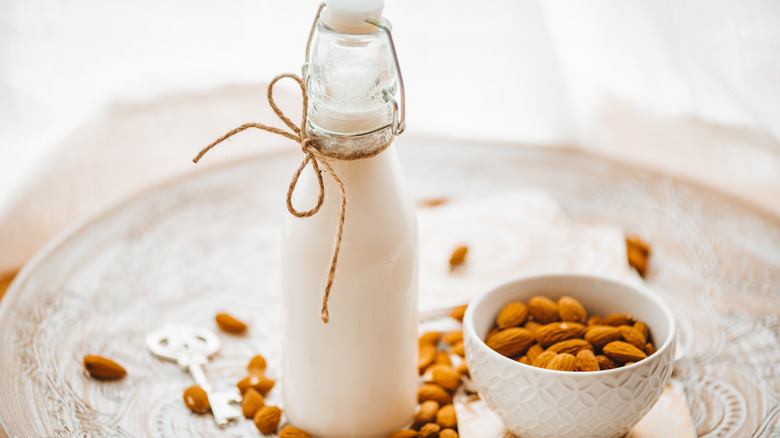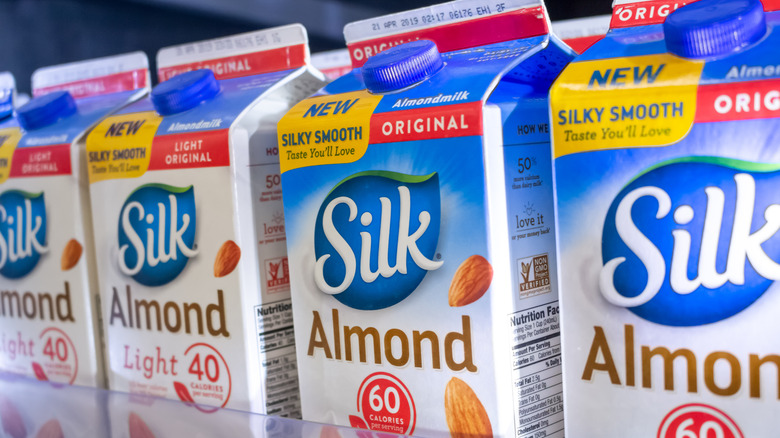Here's How Long You Have To Drink An Open Bottle Of Almond Milk
Plant-based milks grow in popularity each year, and are expected to continue to do so. Of the many milk alternatives on the market, almond milk is definitely one of the most popular. If you are one of the many consumers of this dairy-free alternative, or are curious about adding it to your regular grocery list, you may be wondering how long almond milk lasts in the fridge compared to other milks.
Cow's milk spoils more quickly than any kind of dairy-free milk, but this does not mean that almond milk and its brethren are immune to spoilage. Once opened, store-bought, pasteurized almond milk will stay fresh for up to 10 days. Those same cartons available at the supermarket will last unopened for up to a couple months. This is true for almond milk found in the refrigerated section, as well as the shelf-stable packages you might see on store shelves.
If you bought almond milk refrigerated, it must be stored in the fridge, but if you bought it in a room-temperature carton, it can continue to be stored in the pantry or in a cabinet, as long as the temperature is relatively cool. Meanwhile, preservative-free, fresh almond milk that you make at home yourself or buy from a local specialty producer should be consumed within three to five days.
How can you tell if almond milk has gone bad?
As with all foods, you should observe your almond milk to make sure it's safe to consume. Both homemade and pasteurized almond milks have a tendency to separate after a while, but this does not mean they're rancid or unsafe to eat. All you have to do is give the plant-based milk a good shake, and it should be as smooth and creamy as before. If it does not emulsify after shaking and remains separated, clumpy, chunky, overly thick, or texturally inconsistent in any way, it should be tossed out.
Use your other senses to guide you, as well. Does the milk smell slightly of sweet and nutty almonds, or is it giving off an unpleasant and sour odor? Does it look appealingly off-white, or is it darkening and developing what could be flecks of mold? Even almond milk that's only a day or two old should be tossed if it shows these signs of spoilage.
Keep in mind that any dates printed on a carton of almond milk are meant to be guidelines. According to the Food and Drug Administration, those dates are about optimal quality — not food safety — and perishable products can be opened and consumed beyond that date, so long as they've been stored properly and aren't showing signs of expiration. Keep opened or fresh almond milk at the very back of your fridge, because that is the coldest area.
How to use up an open carton of almond milk
If you have a nearly-full, opened carton of almond milk and don't think you can drink enough lattes or eat enough cereal before it goes bad, don't fret. There are many creative ways to use it up right away. Almond milk works well in baking, and can usually be substituted in a one-to-one ratio for dairy milk. Just be aware that due to its higher water content, baked goods made with almond milk tend to finish cooking more quickly, and don't brown as much. Try making a batch of blueberry-almond muffins, pancakes, or vegan pumpkin pecan rice pudding for a stovetop dessert.
Almond milk is also great in savory preparations. Use it wherever you would normally use milk, or incorporate it into dishes that play well with its flavor profile, such as mashed sweet potatoes or macaroni and cheese with nutty Gruyere.
If you still have some almond milk left over, pour it into an ice cube tray and freeze it. It will keep in the freezer for three to six months. The trade-off is that the texture will change, so it isn't ideal to defrost almond milk and use as if it were fresh, though it is totally safe to do so. Cubes of frozen almond milk are best blended into cold and creamy smoothies and milkshakes.



